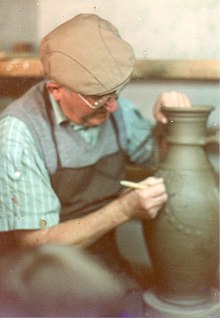Károly Doncsecz
Károly Doncsecz , Slovenian Karel Dončec , (born May 30, 1918 in Orfalu ; † November 12, 2002 in Körmend ) was a Hungarian potter from the national minority of the Slovenes .
Life
Károly Doncsecz was born in Orfalu ( Slovenian Andovci, German Andelsdorf ) in Vas County. His parents Károly Dancsecz (1894–1927) and his mother Anna Talabér (1900–1920), also born in Orfalu, were wealthy small farmers of Slovene descent. He had a brother named István.
The brothers' mother died in childbirth, the father seven years later of tuberculosis. The orphaned brothers were raised for some time by their grandfather István Dancsecz (1871–1932). The young Károly worked for a time in Orfalu for a turner . In Apátsitvánfalva ( Slovene Števanovci, German Stephansdorf ) he first got to know pottery from a potter named Károly Kürnyek. In 1933, at the age of 15, he went to Magyarszombatfa and did a three-year apprenticeship with the potter János Zsohár. His later works show similarities with the pottery style learned there. From 1937 to 1939 he worked at Lajos Németh in Egersee (Zalaegerszeg) , from there he went on to the potter István Adorján in Sümeg . The works of the famous master potter Balázs Badár (1854–1939) from Mezőtúr also influenced his work.
In the course of time he collected various old pottery from the Windisch area and Transdanubia which he used as a pattern. He later kept this work as a sight. Among them you could also find his first ceramics. In 1939 he worked for a short time with János Kerécz in Szentgotthárd , after which he returned to Orfalu. He married Anna Gáspár (1920–1984), with whom he had three children. As a result of the marriage, he moved to Permise (later Kétvölgy ).
In 1942 he was drafted and assigned to Cluj-Napoca . From there he came to Ukraine and fought in the vicinity of Stanislav (now Ivano-Frankivsk ). In 1944 they were attacked by British airplanes as they marched back in Poland and were soon captured by the Russians and deported to the Czech Republic . From there he was able to escape and made it home.
In addition to pottery, he was also engaged in agriculture. Several times he was in the Zala county as a carter and a frequent guest at the Warter Messe in Őriszentpéter. His work has been recognized by the Union of the Hungarian South Slavs and the Union of the Hungarian Slovenes, among others. He died in the Körmend hospital at the age of 84.
Awards
- In 1984 he received the Master of Folk Art award for his work, presented to him by Béla Köpeczi .
- In 2001 he was awarded the Order of Vitézi Rend for his military service. Then he was allowed to call himself Vitéz Károly Doncsecz , but he did not make use of it.
Exhibitions
His ceramics have been shown in numerous exhibitions in Hungary and Slovenia.
literature
- Mária Kozár Mukics: Master of Folk Art - Károly Doncsecz ( Mojster ljudske umetnosti - Karel Dončec Slovenski koledar, Szombathely 1986.)
Individual evidence
| personal data | |
|---|---|
| SURNAME | Doncsecz, Károly |
| ALTERNATIVE NAMES | Dončec, Karel (Slovenian) |
| BRIEF DESCRIPTION | Hungarian potter |
| DATE OF BIRTH | May 30, 1918 |
| PLACE OF BIRTH | Orfalu |
| DATE OF DEATH | November 12, 2002 |
| Place of death | Forming |
